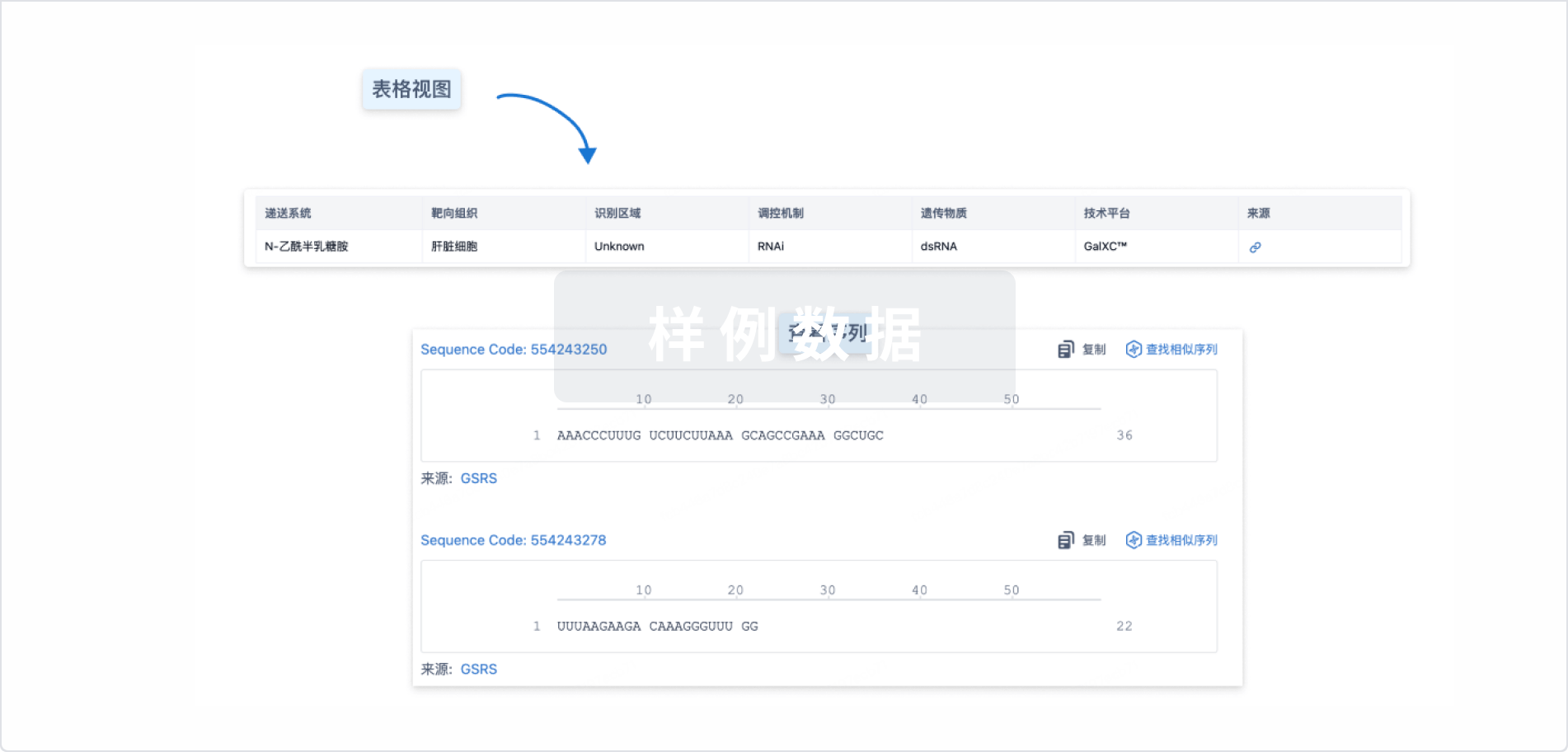预约演示
更新于:2025-05-07
TPI-1100
更新于:2025-05-07
概要
基本信息
药物类型 ASO |
别名 TPI-PD3 project + [2] |
作用方式 调节剂、抑制剂 |
作用机制 PDE4B调节剂(磷酸二酯酶4B调节剂)、PDE4D抑制剂(phosphodiesterase 4D inhibitors)、PDE7A inhibitors(phosphodiesterase 7A inhibitors) |
治疗领域 |
在研适应症- |
非在研适应症 |
原研机构 |
在研机构- |
非在研机构 |
权益机构- |
最高研发阶段终止临床1期 |
首次获批日期- |
最高研发阶段(中国)- |
特殊审评- |
登录后查看时间轴
结构/序列
使用我们的RNA技术数据为新药研发加速。
登录
或

关联
1
项与 TPI-1100 相关的临床试验NCT00914433
A Phase 1,Randomized, Double--blind, Placebo-controlled Study Assessing the Safety and Tolerability, the Pharmacodynamics and Pharmacokinetics of Single-ascending and Repeated Doses of Inhaled TPI 1100 in Healthy Subjects
This study will look at the safety and tolerability of TPI 1100 in healthy volunteers and look at pharmacodynamic (PD) effect on mRNA expression of PDE 4B/D & 7A in blood and in sputum.
开始日期2009-04-01 |
申办/合作机构 |
100 项与 TPI-1100 相关的临床结果
登录后查看更多信息
100 项与 TPI-1100 相关的转化医学
登录后查看更多信息
100 项与 TPI-1100 相关的专利(医药)
登录后查看更多信息
1
项与 TPI-1100 相关的文献(医药)2008-12-01·Pulmonary Pharmacology & Therapeutics3区 · 医学
Advantageous toxicity profile of inhaled antisense oligonucleotides following chronic dosing in non-human primates
3区 · 医学
Article
作者: Aube, Pamela ; Viau, Elisabeth ; Guimond, Alain ; Renzi, Paolo M. ; Ferrari, Nicolay ; Paquet, Luc
1
项与 TPI-1100 相关的新闻(医药)2025-03-09
·药智网
慢性阻塞性肺疾病(简称慢阻肺,COPD)是全球第三大死因[1],传统治疗以支气管扩张剂和激素为主,但患者仍面临急性加重频繁、肺功能进行性下降等困境[2]。2025版慢性阻塞性肺疾病全球倡议(GOLD)迎来历史性更新:首次纳入两款靶向创新制剂——恩塞芬汀(Ensifentrine)和度普利尤单抗(Dupilumab)[3]。这意味着COPD治疗正式迈入“精准靶向时代”,也为中国超1亿COPD患者带来新希望[4]。
注:本文仅作信息交流之目的,文中观点不代表药智网立场,也不是治疗方案推荐。如需获得治疗方案指导,请前往正规医院就诊。
1
划时代的2款靶向创新制剂
1. 恩塞芬汀(Ensifentrine):全球首个吸入式PDE3/4双抑制剂
Ensifentrine[5]由美国Verona Pharma研发,靶向磷酸二酯酶3/4(PDE3/4),适用于成人COPD患者的维持治疗,不区分治疗背景及急性加重史,不同细分人群均可获益。Ensifentrine于2024年6月获得FDA批准用于中重度COPD,于2025年2月在中国澳门获批。
(1)核心优势:全球首个吸入式双靶点药物(PDE3/4),一药三效。PDE主要通过调控cAMP(环磷酸腺苷)和cGMP(环磷酸鸟苷)来起到支气管平滑肌扩张和抗炎作用,而且还可以激活囊状纤维化跨膜转导调节子(CFTR)以降低黏液粘度和增强黏膜纤毛清除功能[6]。
图1 Ensifentrine的作用机制
图片来源:Verona Pharma官网
(2)关键临床试验数据(ENHANCE系列研究):
本次FDA批准主要基于 ENHANCE-1和 ENHANCE-2 两项RCT III期临床试验,数据显示Ensifentrine 可显著改善肺功能并降低疾病恶化率和发作风险,且安全性较高[7]。
主要终点—改善肺功能:相较于安慰剂组,用药12小时后ENHANCE-1中第一秒用力呼气容积(FEV1)改善了87mL,ENHANCE-2中改善了94mL。
次要终点—降低急性加重风险:相较于安慰剂组,24周内,Ensifentrine治疗组显著降低了中重度COPD 患者急性加重率,ENHANCE-1中降低了36%,ENHANCE-2中降低了43%。此外,汇总分析显示,Ensifentrine治疗24周,未来急性加重风险降低41%[8]。
安全性:与安慰剂组不良反应率相当,总体安全性、耐受性表现良好。
图2 ENHANCE系列临床试验疗效数据
图片来源:Verona Pharma官网
(3)临床意义:
填补空白:首个同时改善症状和减少加重的吸入制剂,推动COPD管理迈入“去激素化”时代,尤其适合不耐受激素的患者(如糖尿病、骨质疏松患者的较佳选择)。
便捷高效:其治疗方式是使用标准喷射雾化器将药物直接输送到肺部,这使得药物更容易吸入,不需要高吸气流速或复杂的手呼吸协调。
2. 度普利尤单抗(Dupilumab):全球首个获批的COPD生物靶向药
Dupilumab[9]赛诺菲/再生元联合开发,靶向白细胞介素-4受体亚基α(IL-4Rα),适用于血嗜酸性粒细胞升高且控制不佳的成人COPD患者。Dupilumab的首个获批适应症是中重度特应性皮炎(2017年3月FDA批准),此后不断拓展适应症—哮喘、慢性鼻-鼻窦炎伴鼻息肉、慢性自发性荨麻疹、结节性痒疹、嗜酸性食管炎。直至2024年7月,Dupilumab的第7个适应症率先在欧盟获批,成为首个用于治疗 COPD 的生物靶向药,2024年9月该适应症获得中国国家药品监督管理局(NMPA)批准。
(1)核心优势:全球首个获批的慢阻肺病靶向治疗药物。Dupilumab可特异性结合IL-4Rα亚基,阻断IL-4、IL-13信号传导,抑制嗜酸性粒细胞(EOS)活化,从而减轻慢阻肺病患者的2型炎症反应,抑制疾病进展[10]。
图3 Dupilumab靶向治疗COPD机制
图片来源:参考文献10
(2)关键临床试验数据(BOREAS & NOTUS研究):
本次Dupilumab的获批主要是基于两项具有里程碑意义的Ⅲ期临床试验BOREAS和NOTUS,数据显示[11][12]Dupilumab可有效降低COPD患者的病情恶化率,还能显著提高肺功能(如FEV1值)且安全性较高。
主要终点—降低急性加重风险:两项研究结果显示,当背景治疗中所有患者均接受了最佳标准吸入治疗(几乎所有患者均接受三联疗法)时,相较于安慰剂组,Dupilumab组患者的中重度急性加重发生率在52周内均显著降低,BOREAS研究降低了30%,NOTUS研究降低了34%。随着慢阻肺病患者基线血EOS和呼出气一氧化氮(FeNO)水平升高,Dupilumab治疗对于患者急性加重率的降低越明显。
次要终点—改善肺功能:相较于安慰剂组,BOREAS研究显示Dupilumab组患者的肺功能改善情况可从第2周持续到第52周。在第12周时,Dupilumab组患者的支气管舒张剂前第一秒用力呼气容积(pre-BD FEV1)较基线提升160mL。NOTUS研究结果与BOREAS相似,均提示Dupilumab可为患者带来早期且持续的肺功能改善。
安全性:两项研究中Dupilumab组患者的不良事件发生情况均与安慰剂组类似。
(3)临床意义:
精准治疗:锁定Th2炎症型COPD(约占30%患者),标志着“生物标志物指导治疗”的落地。
跨界价值:合并哮喘、湿疹的COPD患者可“一药多治”。
注:本文仅作信息交流之目的,文中观点不代表药智网立场,也不是治疗方案推荐。如需获得治疗方案指导,请前往正规医院就诊。
2
COPD生物制剂研发管线:百花齐放
目前,慢阻肺领域,全球共有超50条生物制剂研发管线,覆盖不同炎症通路。靶向Th1型炎症通路的生物制剂尚未在慢阻肺病领域显示出显著疗效,探索主要集中在Th2型炎症通路,以及可同时覆盖Th1型/Th2型炎症通路的相关靶点,如IL-5/IL-5R、IL-4(R)/IL-13、TSLP、IL-33、ST2等。本文只讨论热门靶点研发管线。
1. 靶向Th1型炎症通路的COPD生物制剂普遍疗效不佳
在COPD患者中,以中性粒细胞驱动为主的Th1型炎症类型较为常见,因此早期探索集中在TNF-a、IL-8、IL-1等Th1型靶点。但是2001年以IL-8为靶点的 ABX-IL8、2002年的TNF-α抑制剂英夫利昔单抗以及2011年开发的IL-1单抗 MEDI8968 针对 COPD 展开的探索研究均以失败告终。三种药物与安慰剂相比,临床获益欠佳。
2.靶向Th2型炎症通路的COPD生物制剂取得突破
随着研究的深入,靶向Th2型炎症通路相关细胞因子的生物制剂在慢阻肺病领域中逐步展现出积极结果。其中IL-5/IL-5R、IL-4(R)/IL-13是Th2通路的热门靶点。
2.1 靶向IL-5/IL-5R,研发竞争小,美泊利珠单抗有望今年获批
目前针对 COPD 开发的 IL-5/IL-5R 靶点药物仅有三款,贝纳利珠单抗和美泊利珠单抗的研发速度较快。其中GSK在2025年2月宣布中国NMPA已受理美泊利珠单抗注射液的一项新适应症上市申请,用于具有嗜酸性粒细胞表型的慢性阻塞性肺疾病(COPD)患者的维持治疗。如果获批,美泊利珠单抗有望成为首个获批的每月一次的 COPD生物制剂。
表1 靶向IL- 5/IL- 5R的COPD生物制剂研发进展
数据来源:药智数据,药智咨询整理
2.2 靶向IL-4(R)/IL-13,国内企业研发进展较快
IL-4和IL-13是Th2型炎症通路的关键驱动因子。目前靶向IL-4(R)/IL-13 靶点的药物共有10款。目前仅有度普利尤单抗已上市,国内公司康诺亚/石药集团的司普奇拜单抗和三生国健研发的SSGJ-611研发进度较快,分别处于临床Ⅲ期和临床Ⅱ期。
表2 靶向 IL-4(R)/IL-13的COPD生物制剂研发进展
数据来源:药智数据,药智咨询整理
3.靶向上皮警报素类细胞因子,全球研发进度相近,国产跟进速度快
上皮细胞来源的警报素类细胞因子,位于炎症级联反应顶端,可同时参与Th1和Th2炎症反应。近年来,靶向该阶段的生物制剂亦在慢阻肺病领域展开探索,其中TSLP、IL-33、ST2是热门靶点。目前针对TSLP靶点研发的药物共有8款,其中4款已进入临床Ⅱ期阶段(3 款属于跨国药企);针对IL- 33/ST2 靶点研发的药物共有7款,其中3款已进入临床Ⅲ期阶段,均为跨国药企开发,国内公司迈威生物开发的9MW1911已进入临床Ⅱ期阶段。
表3 靶向上皮警报素类细胞因子的COPD生物制剂研发进展
数据来源:药智数据,药智咨询整理
4.靶向PDE3/4的生物制剂研发管线目前仅有PXSTPI-1100这1条,处于临床I期,由Pharmaxis Ltd公司发起,但自2009年后未再更新研发进展。针对PD3/PD4靶点的化药研发管线较多(30条),可能随着新药恩塞芬汀投入临床应用,减轻COPD患者疾病负担,市场的良好反馈或许能引发针对PDE3/4生物制剂的研发热潮。
注:本文仅作信息交流之目的,文中观点不代表药智网立场,也不是治疗方案推荐。如需获得治疗方案指导,请前往正规医院就诊。
3
结语:COPD治疗的范式革命
2025版GOLD指南对生物制剂的正式纳入,标志着COPD治疗将从“一刀切”的时代,逐渐迈入个体化精准治疗新纪元。国内外企业争相布局IL-5/IL-5R、IL-4(R)/IL-13、TSLP、IL-33、ST2等热门靶点,未来研发将呈现两大趋势:其一,临床研究设计可能会偏向于患者分层,便于后续临床基于生物标志物(如血嗜酸粒细胞、FeNO)选择靶向药物;其二,生物制剂与传统药物联用,延长疗效并减少激素依赖。以恩塞芬汀和度普利尤单抗为代表的新型靶向药物和生物制剂,不仅为患者提供了全新的治疗选择,更深刻揭示了COPD异质性炎症机制的本质。随着更多精准靶向药物的研发上市,以“对因治疗”为核心的精准医学范式,或将重构呼吸系统疾病的整体诊疗格局。
参考文献:
[1] Li M, et al. BMJ Open Respir Res. 2023 Jul;10(1):e001698.
[2] 中华医学会呼吸病学分会慢性阻塞性肺疾病学组等.中华结核和呼吸杂志, 2021,44(3) : 170-205.
[3] GOLD.https://goldcopd.org/2025-gold-report/.
[4] Wang C, et al. Lancet. 2018 Apr 28;391(10131):1706-1717.
[5] Ensifentrine说明书
[6] Cazzola, M.et al. Int J Chron Obstruct Pulmon Dis. 2023 Jun;18:1333–1352.
[7] Anzueto A, et al. Am J Respir Crit Care Med. 2023;208(4):406-416.
[8] Sciurba FC, et al. Chest. 2025;167(2):425-435.
[9] Dupixent approved in the US as the first-ever biologic medicine for patients with COPD. Retrieved September 27, 2024.
[10]中华医学会变态反应学分会过敏性疾病基础研究与转化医学学组(筹). 中国临床实用医学,2023,14(04):1-22.
[11]Bhatt SP, et al. N Engl J Med. 2024;390(24):2274-2283.
[12]Bhatt SP,et al. N Engl J Med. 2023;389(3):205-214.
声明:本内容为作者独立观点,不代表药智网立场。如需转载,请务必注明文章作者和来源。对本文有异议或投诉,请联系maxuelian@yaozh.com。
责任编辑 | 斯蒂文
合作、投稿、转载开白 | 马老师 18323856316(同微信)
如需定制医药咨询服务,请扫描下方二维码咨询!
阅读原文,是受欢迎的文章哦
临床3期临床结果
100 项与 TPI-1100 相关的药物交易
登录后查看更多信息
研发状态
10 条进展最快的记录, 后查看更多信息
登录
| 适应症 | 最高研发状态 | 国家/地区 | 公司 | 日期 |
|---|---|---|---|---|
| 慢性阻塞性肺疾病 | 临床1期 | - | 2009-04-01 |
登录后查看更多信息
临床结果
临床结果
适应症
分期
评价
查看全部结果
| 研究 | 分期 | 人群特征 | 评价人数 | 分组 | 结果 | 评价 | 发布日期 |
|---|
No Data | |||||||
登录后查看更多信息
转化医学
使用我们的转化医学数据加速您的研究。
登录
或

药物交易
使用我们的药物交易数据加速您的研究。
登录
或

核心专利
使用我们的核心专利数据促进您的研究。
登录
或

临床分析
紧跟全球注册中心的最新临床试验。
登录
或

批准
利用最新的监管批准信息加速您的研究。
登录
或

特殊审评
只需点击几下即可了解关键药物信息。
登录
或

生物医药百科问答
全新生物医药AI Agent 覆盖科研全链路,让突破性发现快人一步
立即开始免费试用!
智慧芽新药情报库是智慧芽专为生命科学人士构建的基于AI的创新药情报平台,助您全方位提升您的研发与决策效率。
立即开始数据试用!
智慧芽新药库数据也通过智慧芽数据服务平台,以API或者数据包形式对外开放,助您更加充分利用智慧芽新药情报信息。
生物序列数据库
生物药研发创新
免费使用
化学结构数据库
小分子化药研发创新
免费使用
